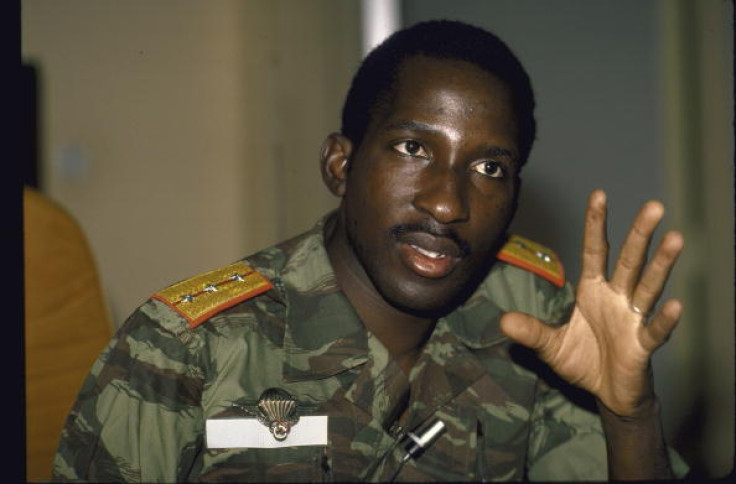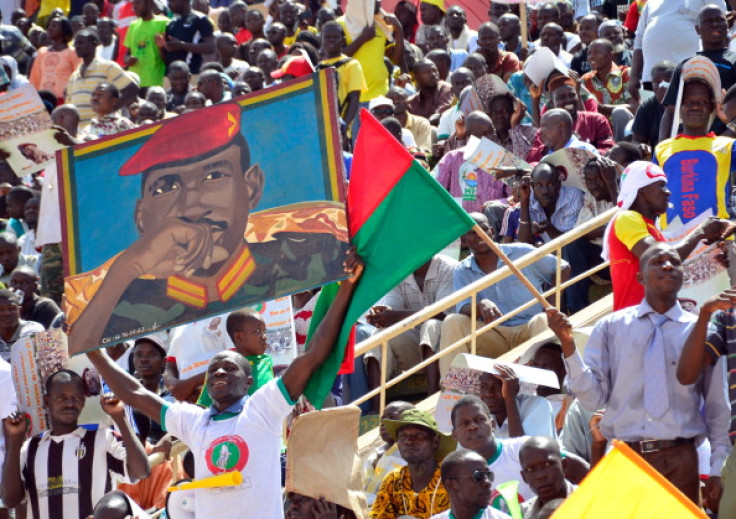Thomas Sankara: Body of Africa's Che Guevara riddled with bullets, autopsy reveals three decades after death

An autopsy on the supposed remains of Thomas Sankara, former leader of Burkina Faso killed during a 1987 coup d'etat, has revealed that the body was riddled with bullets. The corpse believed to be of Sankara and the remains of other 12 people killed in the coup were exhumed in May.
Following his assassination, Sankara's body was dismembered and buried in an unmarked grave and his death certificate stated the man had died of "natural causes". Permission to conduct examinations on the remains was previously denied by former leader Blaise Compaore, who ruled Burkina Faso for 27 years after taking power following the coup that killed Sankara. Comparore is suspected of having ordered the assassination of Sankara and the other 12 officials.
"In terms of the [gunshot] wounds, what was found in relation to Thomas Sankara's body is really mind-boggling. We can say he was purely and simply riddled with bullets," Ambroise Farama, one of the lawyers representing Sankara's widow Mariam, told reporters, according to news agency AFP.
"Concerning the others, one or two gunshot wounds were found here and there. But as far as Thomas Sankara was concerned, there were more than a dozen all over the body," Farama said and added that bullets found below the armpits suggested that Sankara had raised his arms to surrender.

Africa's 'Che Guevara'
A former army captain, Sanakara earned the nickname of "Africa's Che Guevara" due to his anti-imperialism fight and socio-economical changes he tried to implement in the country after taking power following a coup in 1983, organised by Comparore himself. Sankara and Comparore had met in Morocco and the two became members of the secret organisation Communist Officers' Group (ROC).
After taking office, Sankara changed the official name of the country, Upper Volta, to Burkina Faso, which means The Land of Upright Men. One of his main goals was to create self-sufficiency and reduce dependence on foreign aid. Among other things, Sankara reformed the judicial system, launched vaccination campaigns to reduce epidemics and promoted projects to redistribute lands and assist the poor.
In a speech delivered during his presidency, Sankara said: "Che Guevara taught us we could dare to have confidence in ourselves, confidence in our abilities. He instilled in us the conviction that struggle is our only recourse. He, was a citizen of the free world that together we are in the process of building. That is why we say that Che Guevara is also African and Burkinabè."
Sankara also promoted women's rights and he banned child marriage, female genital mutilation and polygamy. During his leadership, an unprecedented number of women held posts in the government.
Sankara's administration was however accused of committing human rights violations such as arbitrary detentions and extrajudicial executions. Freedom of association was also undermined and prisoners were not always granted fair trials.
2015 coup leader behind Sankara's assassination
Compaore stepped down in 2014 and fled to Ivory Coast following violent protests sparked after his decision to amend the constitution to participate in 2015's presidential election. During his leadership, Compaore had installed presidential guard known as Régiment de Sécurité Présidentielle (RSP), which remained in power even after interim president Michel Kafando took office in 2014.
In September, the RSP, led by General Gilbert Diendere, carried out a military coup and ousted Kafando weeks before the election, originally scheduled for October, was due to be held. Following violent protests that resulted in the deaths of at least 10 people and negotiations chaired by the Economic Community of West African States (Ecowas), Kafando was reinstated as interim leader, while the RSP were disbanded and Diendere was charged with murder.
The general, a staunch ally of Comparoe, is believed to have been behind the killing of Sankara and the other 12 officials.
© Copyright IBTimes 2024. All rights reserved.







